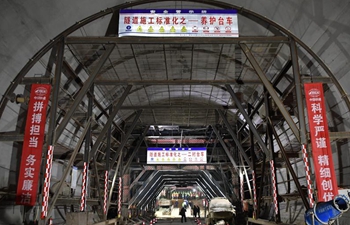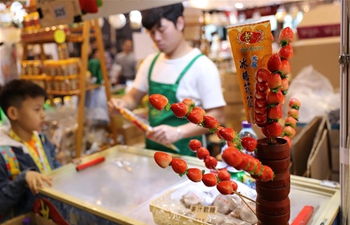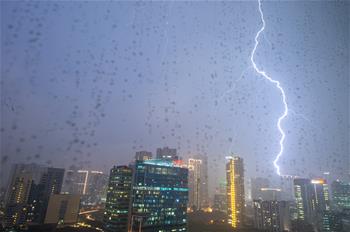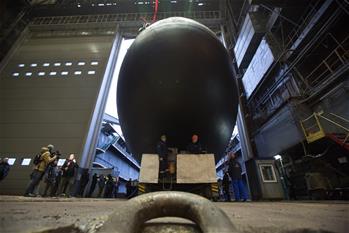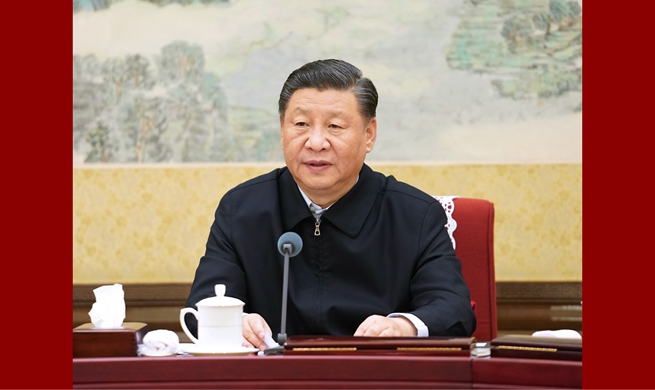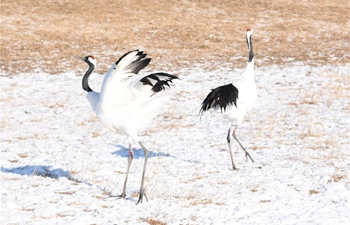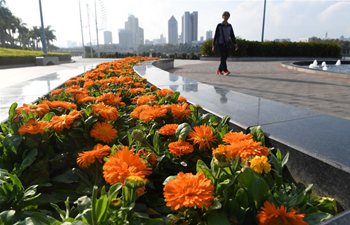YINCHUAN, Dec. 28 (Xinhua) -- In the remote Xiamaguan Township of northwest China's Ningxia Hui Autonomous Region, swathes of green asparagus sway in the endless loess field.
Farmer Dong Yi started growing asparagus in 2017 when local officials encouraged villagers to cultivate the green plant to get out of poverty.
"We had never seen asparagus before, and everybody doubted if the plant could survive the harsh environment here," said Dong, 56. "But I decided to try it anyway, because I was struggling to make money."
Xiamaguan Township is located deep in the mountains, and the dry weather there leaves it in dire need of water. The township is among Ningxia's poorest, where many people are still struggling to make ends meet.
Despite years of prosperity in the coastal regions, pockets of residents still lag behind in China's underdeveloped rural areas, which poses a challenge for the country's battle to wipe out absolute poverty by 2020.
In 2012, China had 98.99 million rural people living under the national poverty line of 2,300 yuan (329 U.S. dollars) in annual income. By the end of 2018, the number had dropped by 82.4 million, with 16.6 million still left in poverty. Ningxia is home to one of the largest poor populations in China.
However, the asparagus has brought fortunes to Xiamaguan Township, with more than 100 families having been lifted out of poverty since the industry took root there, according to the latest government figures. Currently, more than 130 hectares of asparagus thrive in the fields.
In the past, asparagus was something unheard of among impoverished farmers such as Dong Yi in Xiamaguan. Dong's family has about three hectares of land. For generations, the family depended on grain plantation to make a living, though they barely made enough money to live a decent life.
A few years ago, a series of irrigation projects pumped water from the Yellow River into the dry, sandy lands in Ningxia. The Yellow River is China's second-longest river. With more water, local residents decided to grow more crops, said local Party official Dong Zhanping.
"The farmers tried a variety of plants at first, including traditional Chinese herbs, and corn, but the yields were less than satisfactory," the official said.
In 2017, township officials decided to introduce asparagus to the area after multiple field surveys. They invited a company that had success growing asparagus in a nearby county.
"We persuaded farmers to lease their land to us and we managed the land collectively," Dong Zhanping said, adding that they gave 3,000 yuan to the farmers for each hectare of land they leased. Experts then cultivated asparagus seedlings in greenhouses, before planting them in the fields, depending on dripping irrigation technology.
"Different from the bamboo in southern China, asparagus can adapt to a very dry environment, which is why the land in Xiamaguan is perfect for its cultivation," said company manager He Jiang. "Besides, the air here is fresh, and the soil is very clean, so the asparagus grown here is very good quality."
In 2017, Dong Yi, the local farmer, went to learn about asparagus cultivation with the company's technical staff in east China's Shandong Province. He learned about weeding and fertilizing there, and returned home to train other villagers. By commanding new techniques and with hard work, farmers like Dong saw the potential of the industry after reaping a good harvest.
"This year we will have another bumper harvest," he said. "Currently, more than 200 villagers are toiling in the fields."
The success of Xiamaguan Township has permeated to other villages, according to local officials. In the past, many farmers left home for big cities for decent-paying jobs, but now they stay in their hometown and attend to the asparagus.
Dong Yi said the asparagus is in high demand, with orders from buyers in the provinces of Shandong and Guangdong. Many of the buyers purchased the crop online.
"When the harvest season comes in January, we will rake in more than 150,000 yuan per hectare," he said.
The asparagus industry has also brought environmental benefits, including less sandy areas and more moist air, in addition to the economic boost.
"We hope to bring more farmers into the industry," said Party official Dong Zhanping. "The plant has truly changed lives here."




